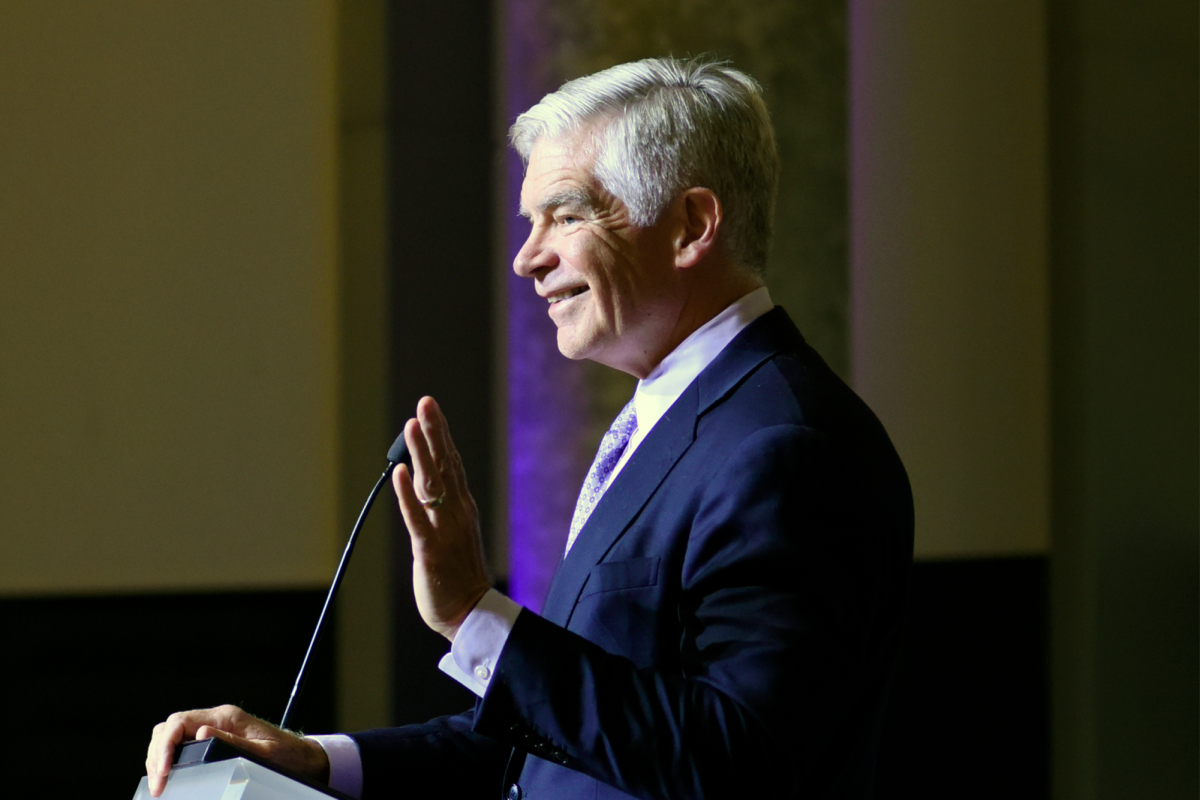Federal Reserve Bank of Philadelphia President and CEO Patrick Harker delivered the Leon N. Moses Distinguished Lecture in Transportation in front of a crowd of about 80 on Wednesday evening.
In his 30 minute talk at the Kellogg School of Business Global Hub, titled “Fulfilling John Hayford’s Legacy: Moving Economics Toward a New Way to Value Infrastructure,” Harker emphasized the need to look beyond the immediate costs of potential infrastructure projects and consider their long-term economic benefits.
Harker — who previously served as president of the University of Delaware and dean of the Wharton School at the University of Pennsylvania — noted that it has been about 70 years since the United States’ last great infrastructure boom.
“This is not just a time for us to get better at fixing, but a time for us to take stock of what we built in the first place and the long-term implications of what we may build in the future,” he said.
Harker said the country’s current transportation infrastructure perpetuates racial and socioeconomic inequalities.
He cited railroad placement as an example, which he said has contributed to racial segregation. He added that public transit systems and highways across the country have historically catered to suburbanites at the expense of those living in inner cities.
“Simply making repairs — while they’re necessary — in many ways will only extend or even exacerbate long-standing inequities,” he said.
Toward the end of his talk, Harker addressed the state of the broader economy, saying the country is experiencing “a slow but steady disinflation.” He added that he expects economic resilience to continue over the next few years.
The lecture, named after the late Northwestern economics professor and NU Transportation Center Director Leon N. Moses, returned after a four-year hiatus. It had previously been held every other year since 2011.
McCormick Professor and current Head of the Transportation Center Hani Mahmassani told The Daily he selected Harker to give the lecture due to his expertise in transportation economics.
“Understanding the economic value that transportation infrastructure has is important,” he said. “I also hope (audience members) took away that with these benefits come certain impacts on local communities that clearly are not desirable, and therefore one needs to try and remedy some of these negative impacts.”
Audience members said they found the talk informative.
McCormick graduate student Bob Cook said it was helpful that Harker quantified the inequalities caused by highways.
“Having some actual numbers on how bad highways are for the people who live in the city connected to the highway was interesting,” he said. “I didn’t know the extent of that.”
He added that Harker’s discussion was relevant to his studies in energy and sustainability.
Keith Stauber (Weinberg ’87) — who works in the commercial real estate industry and has previously guest lectured for the Transportation Center — said he appreciated Harker’s positive, forward-thinking message.
“It was really encouraging to hear from the highest levels of government that they’re thinking about how we can be better as a country to uplift all of our citizens,” he said.
Email: elikronenberg2027@u.northwestern.edu
Twitter: @EliKronenberg
Related Stories:
— Author Nathan Thrall speaks about new book on Israeli-Palestinian conflict
— NPEP hosts panel on rehabilitation and reentry for incarcerated people
— Northwestern College Democrats to host Beto O’Rourke as fall speaker



















